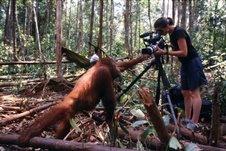South-east Asia's Peat Fires and Global Warming
-for immediate release-
South-east Asia's Peat Fires and Global Warming
Joint Press Release by Ecological Internet, Biofuelwatch, Watch
Indonesia and Save the Rainforest (Germany)
November 11th, 2006
At Nairobi, governments are debating the future of the Kyoto Protocol and action to prevent the most serious impacts of climate change. So far, they appear to have ignored pleas to address one of the greatest single sources of carbon emissions: the destruction of South-east Asia's peatlands and forests. The annual emissions from annual peat and forest fires are about five times as great as the total annual emission cuts which the Kyoto Protocol aims to make by 2012, from 1990 levels.
Indonesia alone holds 60% of all tropical peat, containing some 50 billion tonnes of carbon. This is equivalent to 7-8 years of global fossil fuel emissions. Timber and oil palm plantations are draining the peatlands and also pushing local communities and small-holders into peat areas and rainforests. Once this peat is drained, all this carbon will eventually be released into the atmosphere, unless the peat is subsequently re-flooded and restored. Annual fires, many of them set deliberately by plantation owners, speed up the process.
This year's fire season has been one of the worst on record. Wetlands International warned earlier this week that the boom in biofuels is speeding up the destruction, and further that one tonne of palm oil grown on peat is linked to the release of around 20 tonnes of carbon dioxide released from that peat. Due to its low cost, palm oil is set to become the prime feedstock for biodiesel. Biofuelwatch member UK Green Party Councillor Andrew Boswell says from Nairobi: "Over 6600 people from 75 countries have emailed governments to call for real action to address the causes of the annual peat and forest fires. So far, there are no signs that delegates have listened. UNFCCC exists to prevent dangerous climate change and to stabilise levels of greenhouse gases in the atmosphere. This will be even harder to achieve unless tropical peatlands are protected and restored. Ecological Internet, Biofuelwatch, Save the Rainforest (Germany) and Watch Indonesia are calling on the Conference to agree to international assistance with fighting the fires which are still burning on Borneo, and to set up a working group which will draw up proposals for the protection and restoration of the peatlands which must report back within a year. They stress that those proposals must be developed in close co-operation with local communities and the South-east Asian NGOs representing them and must take full account of the needs of local people, and also of the need to protect those forests which are not part of the peatlands. "
Contacts:
Andrew Boswell, Biofuelwatch: Nairobi contact 0720833788 (until 17/11
only); from outside Kenya 254-720833788
Dr Glen Barry, President of Ecological Internet, USA:
GlenBarry@..., Tel +1 920 776 1075
Notes:
1. Biofuelwatch is a UK campaign which seeks regulation to ensure that only sustainably-sourced biofuels can be sold in Britain in the European Union. See Biofulewatch
2. Ecological Internet (EI) provides the most successful Internet based environment portals, search engines and international Earth advocacy network ever, regularly achieving environmental conservation victories around the world. EI specializes in the use of the Internet to achieve environmental conservation outcomes. Ecological Internet's mission is to empower the global movement for environmental sustainability by providing information retrieval tools, portal services and analysis that aid in the conservation of climate, forest, water and ocean ecosystems; and to commence the age of ecological sustainability and restoration. On average 30,000 visits a day are made to our environmental portals. See
Ecological Internet
3. Save the Rainforest (Rettet den Regenwald e.V.) campaigns against the abuse of rainforest by industrialised countries and organises support for indigenous people in the forests. See
Save the Rainforest
4. Watch Indonesia is a German-based working group for democracy, human rights and environmental protection in Indonesia and East Timor. See Watch Indonesia
5. For a fully referenced background paper about the peat and forest fires in south-east Asia, and their contribution to global warming, see Biofuelwatch PDF
6. For the figures provided by Wetlands International, see Wetlands International





